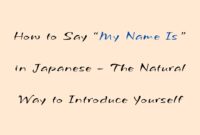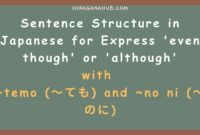Stating Cause with ので in Japanese
In this article, we will learn how to use ので to express
cause in Japanese. ので has the same meaning as
から (“because”), but there is an important difference. The
use of ので tends to sound more polite and gentle compared to
から, which is more direct.
If you’re already familiar with the sentence pattern using
から, using ので is almost the same. The
sentence structure is:
Sentence 1 (cause) + ので + Sentence 2 (result)
Sentence Structure Using ので

To use ので, the structure is very simple: a sentence stating
the cause is followed by ので, and then the second sentence
shows the result or outcome of the cause.
Example Sentence 1:
よくれんしゅうするのでできるんです。
Yoku renshuu suru no de dekiru n desu.
Because I practice
often, I can do it.
ねむいので、もうねます。
Nemui node, mou nemasu.
Because I’m sleepy, I will go to
sleep.
あめがふっているので、うちにいます。
Ame ga futteiru node, uchi ni imasu.
Because it’s raining, I will stay at home.
じてんしゃがこわれたので、あるいていきます。
Jitensha ga kowareta node, aruite ikimasu.
Because my bike is broken, I will walk.
This pattern naturally connects cause and result in a gentle and clear way.
Difference Between から and ので
Although both から and ので mean “because”,
there is a difference in usage. から tends to sound more
direct and is less formal than ので. When we want to speak in
a more polite or formal manner, ので is the better choice.
Example Sentence 2:
しんせつなのでかのじょはともだちがおおいです。
Shinsetsu na no de kanojo wa tomodachi ga ooi desu.
She has many friends because she is kind.
Here, we use な before ので because the
adjective shinsetsu (kind) is a
na-adjective. If you are using an
i-adjective, you do not need to add な.
Casual Form んで
Sometimes, ので can be shortened to んで to
make it easier to say. However, this form is more casual and should not be
used in formal situations.
Example Sentence 3:
かっこういいんでにほんごがとてもすきです。
Kakkou ii nde nihongo ga totemo suki desu.
I like Japanese because it’s so cool.
Even though んで is easier to say, be cautious when using it.
Do not use んで in very formal or official contexts.
Omitting the Cause Sentence
Just like with から, in some cases, the cause sentence can be
omitted if it is already understood from the context. In this case, only the
result is stated.
Example Sentence 4:
なので、ぼくがすきです。
Nanode, boku ga suki desu.
Because of that, I like it.
Here, we mention only the result, without explicitly stating the cause, since
it is understood from the context.
Vocabulary
Here is a vocabulary list used in the example sentences:
| Kanji | Hiragana | Romaji | Meaning |
|---|---|---|---|
| 眠い | ねむい | nemui | sleepy |
| 雨 | あめ | ame | rain |
| 家 | うち | uchi | home |
| 自転車 | じてんしゃ | jitensha | bicycle |
| 壊れる | こわれる | kowareru | broken |
| 歩く | あるく | aruku | to walk |
| 日本語 | にほんご | nihongo | Japanese |
| 好き | すき | suki | like |
| 勉強 | べんきょう | benkyou | study |
By using ので, you can easily connect causes and results in
Japanese in a more polite and gentle way. If you want to speak more directly,
you can use から. However, ので is a better
choice when speaking in more formal or polite situations.
Keep practicing using ので in your daily conversations! The
more you practice, the more fluent your Japanese will become. If you have any
questions or would like to share your learning experience, don’t hesitate to
ask in the comments.
I hope this explanation has been helpful and makes learning Japanese easier.
See you in the next article!


